AUSTRALIANS can learn an important lesson from the recent actions of the UK Parliament.

Prime Minister David Cameron argued he was not embarrassed about having the proposal for military action in Syria rejected by his parliament. However, the decision illustrates the importance of the parliament containing the unilateral action of a leader in the Westminster system.
A call from US President Barack Obama had persuaded him of the need to take military action against the Assad regime over the use of chemical weapons. The Parliament was not convinced. One outcome of the parliamentary decision is that Obama will now take a similar motion to Congress – he cannot have the US seen to be less democratic than Britain.
In the Australian federal system, the Senate has for many years been the point of accountability – rejecting and modifying the more extreme ideas of the government of the day. A majority government with a majority in the Senate has very little parliamentary accountability relying on members of conscience to cross the floor. This is a rare phenomenon, and even more rare when it actually reverses a decision taken by government.
The Senate has developed a balanced Committee system that seeks to have representation from across the political spectrum at the same time as fulfilling its role to protect the States and, to a less extent, the Territories. Care is taken to consider each issue and to make recommendations to the whole Senate that, in turn, modifies or rejects legislation from the lower House.
The concentration of power in the hands of the party leaders in the Westminster system has been increasing over the last few decades. Recently, Kevin Rudd even managed to secure retaining leadership with just 25 per cent of his own party.
Although Cameron is leader of a coalition government dominated by the Conservatives, his deputy, Nick Clegg, is leader of the Liberal Democrats and the party discipline that has been the mark of many Westminster systems is not as enforceable. Before the UK vote, Clegg was publicly warning: “Britain must not become involved in a conflict it would struggle to influence”.
Clegg was not convinced the US had the evidence about the Assad regime using chemical weapons and, no doubt, remembered lessons from the invasion of Iraq.
“The Liberal Democrats would remain wary of arming the militants in Syria” and Britain “should not go beyond providing foreign-backed insurgents with non-lethal assistance”, he warned.
When his former Labour PM, Tony Blair, joined the invasion of Iraq as one of the leading forces of the “Coalition of the Willing” he did so because the then-US President George W Bush had convinced him Iraqi President Saddam Hussein was storing weapons of mass destruction (WMDs).
The British Parliament had long enough memories to see the same pattern. Following the rejection in the Parliament, a White House spokesman revealingly said America would proceed to take action in whatever was in the best interests of the US. Clearly it is about what suits the US and an admission that their intent is nothing to do with the best interests of the people of Syria.
In the middle of an election campaign, our own Prime Minister, Kevin Rudd, also had a conversation with President Obama and immediately launched into the bellicose rhetoric of “overwhelming evidence” of the use by the Assad regime of this particular weapon of mass destruction – chemical warfare and the need for action.
It is not enough that we know that chemical weapons have been used. The Australian Government must know who used them.
The US has been very public that the use of chemical weapons would be the “line in the sand” for military intervention. This has provided an demonstrative motive for the Syrian opposition forces to deploy a single chemical weapon in order to bring the US and her allies into the conflict – a relatively small strategic price pay for the outcome.
Australia, like Britain and now the US, should not participate militarily in Syria without full support from both Houses of our Parliament.
Michael Moore was an independent member of the ACT Legislative Assembly (1989 to 2001) and was minister for health
Who can be trusted?
In a world of spin and confusion, there’s never been a more important time to support independent journalism in Canberra.
If you trust our work online and want to enforce the power of independent voices, I invite you to make a small contribution.
Every dollar of support is invested back into our journalism to help keep citynews.com.au strong and free.
Thank you,
Ian Meikle, editor





Leave a Reply